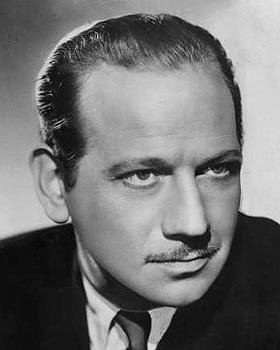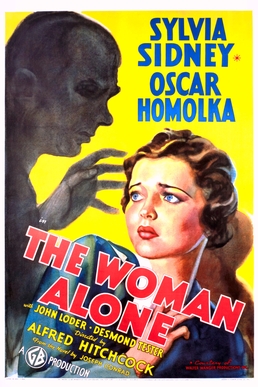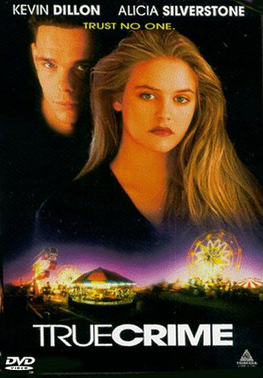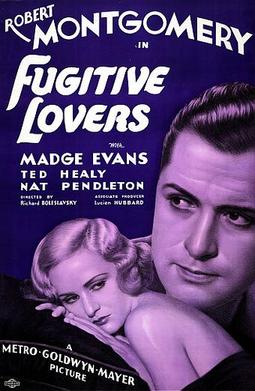Plot
Mary Burns (Sylvia Sidney) runs a small roadside coffee shop near a rural town. She's desperately in love with 'Babe' Wilson (Alan Baxter), a young man who has fallen in love with Mary after coming to her coffee shop several times. However, Mary isn't aware that Babe is a gangster wanted for robbery and murder.
Babe and his partner in crime arrive at the coffee shop, and Babe tells Mary he has to go to Canada right away on “business”, but he wants them to get married immediately and go away with him. Unfortunately, Mary doesn't know that Babe's suitcase is filled with stolen loot.
As they prepare to leave, the police arrive to arrest Babe, but he kills his own partner to prevent him from testifying, then he escapes and leaves Mary to be arrested and convicted for aiding and abetting a known criminal.
After serving three years of her fifteen-year sentence, Mary escapes with a fellow female inmate, Goldie Gordon (Pert Kelton), unaware that Goldie is actually cooperating with the police. They want to use Mary to lure Babe out of hiding. Mary gets a job as a maid at a hospital, and she meets Barton Powell (Melvyn Douglas), a famous explorer and writer who is recovering from snow blindness. They fall in love after Mary spends several weeks reading to the blind man and talking with him about his adventures.
When one of Babe's accomplices, Spike (Brian Donlevy), comes to the small apartment that Mary and Goldie share and says he's taking her to Babe, Mary flees and goes to the hospital to see Barton one last time. She doesn't tell him she's leaving forever, she simply slips out quietly after he falls asleep.
Mary travels from Oklahoma to Utah and hides out in a small town, but Babe finds her and tries to abduct her during a church service. However, the police have tracked Mary to the small town. Undercover men among the congregation try to arrest Babe, but he shocks the crowd by producing a hand grenade, and he threatens to pull the pin if they don't let him leave with Mary. Babe and Mary escape, and he instructs her to hide again until he can find a way to rejoin her.
Mary is terrified of the homicidal killer, and she hopes he won't find her, but the police succeed in doing so again, and Detective Harper (Wallace Ford), the policeman in charge of the manhunt, takes her to Barton Powell's rustic lakeside house to reunite the couple. Barton has recovered his sight and sees Mary for the first time with his own eyes. He promptly proposes, and Mary accepts.
Detective Harper and his men stake out Barton's lakeside home and wait for Babe to show up to get Mary. But the wily killer manages to sneak into the house, and he threatens to shoot Barton if Mary doesn't leave with him.
Mary pretends she's about to kiss Babe, but she reaches inside his coat, takes hold of a second pistol in his shoulder holster, and pulls the trigger several times, killing Babe. Afterwards, Detective Harper sees to it that Mary's criminal record is expunged, and she marries Barton.

Melvyn Douglas was an American actor. Douglas came to prominence in 1929 as a suave leading man, perhaps best typified by his performance in the romantic comedy Ninotchka (1939) with Greta Garbo. Douglas later played mature and fatherly characters, as in his Academy Award-winning performances in Hud (1963) and Being There (1979) and his Academy Award–nominated performance in I Never Sang for My Father (1970). Douglas was one of 24 performers to win the Triple Crown of Acting. In the last few years of his life Douglas appeared in films with supernatural stories involving ghosts, including The Changeling in 1980 and Ghost Story in 1981, his last completed film role.

Sabotage, released in the United States as The Woman Alone, is a 1936 British espionage thriller film directed by Alfred Hitchcock starring Sylvia Sidney, Oskar Homolka, and John Loder. It is loosely based on Joseph Conrad's 1907 novel The Secret Agent, about a woman who discovers that her husband is a terrorist agent.

True Crime is a 1996 American psychological thriller film directed and written by Pat Verducci and starring Alicia Silverstone and Kevin Dillon.

The Bowery is a 1933 American pre-Code historical comedy-drama film set in the Lower East Side of Manhattan around the start of the 20th century directed by Raoul Walsh and starring Wallace Beery and George Raft. The supporting cast features Jackie Cooper, Fay Wray, and Pert Kelton.

Bed of Roses is a 1933 pre-Code romantic comedy film co-written and directed by Gregory La Cava and starring Constance Bennett. The picture was released by RKO Radio Pictures with a supporting cast featuring Joel McCrea and Pert Kelton.

Nazi Agent is a 1942 American spy film directed by Jules Dassin, in his first feature-length film for MGM. It stars Conrad Veidt playing identical twins, one loyal to the United States (U.S.), the other a dedicated German Nazi.

The Last of Mrs. Cheyney is a 1937 American comedy drama film adapted from the 1925 Frederick Lonsdale play The Last of Mrs. Cheyney. The film tells the story of a chic jewel thief in England, who falls in love with one of her marks.

There's Always a Woman is a 1938 American comedy mystery film directed by Alexander Hall and starring Joan Blondell and Melvyn Douglas. Seeing the potential for a series, Columbia Pictures quickly made a sequel, There's That Woman Again, released the same year, with Douglas reprising his role, but with Virginia Bruce as Sally. No further sequels were made.

The Guilt of Janet Ames is a 1947 American sentimental film noir directed by Henry Levin, based on a story by Lenore Coffee, and starring Rosalind Russell and Melvyn Douglas. It was produced and distributed by Columbia Pictures.

Fast Company is a 1938 American mystery film directed by Edward Buzzell and starring Melvyn Douglas and Florence Rice as married rare-book dealers who try to solve a murder case. It is based on the novel of the same name by Marco Page. It was followed by two 1939 films featuring the fictional couple, Fast and Loose and Fast and Furious, although different actors played the leads in each of the three films. To avoid confusion with a 1953 MGM film of the same title, Fast Company was retitled Rare Book Murder for television.

Rapture is a 1965 drama film directed by John Guillermin, and starring Melvyn Douglas, Patricia Gozzi, and Dean Stockwell. It is reportedly Guillermin's own favorite among his films. His widow Mary said it "was the only film he directed that wholly satisfied his vision as an artist."

A Gentleman After Dark is a 1942 crime/drama film starring Brian Donlevy and Miriam Hopkins.

Behold My Wife! is a 1934 drama film directed by Mitchell Leisen. It stars Sylvia Sidney and Gene Raymond. Based on a novel by Sir Gilbert Parker, The Translation of a Savage, the story had been filmed before in the silent era in 1920 as Behold My Wife! starring Mabel Julienne Scott and Milton Sills. One of the plot's themes is a white man's romance and eventual marriage to an Apache woman.

Sitting on the Moon is a 1936 American musical film directed by Ralph Staub and released by Republic Pictures.

Fugitive Lovers is a 1934 American pre-Code comedy drama film directed by Richard Boleslavsky. Released by Metro-Goldwyn-Mayer, it stars Madge Evans and Robert Montgomery with a supporting cast of Nat Pendleton, C. Henry Gordon, Ruth Selwyn, and Ted Healy and his Stooges, who are credited as "The Three Julians" in this production.
Charlie Chan in Reno is a 1939 American mystery film directed by Norman Foster, starring Sidney Toler as the fictional Chinese-American detective Charlie Chan, based on an original story "Death Makes a Decree" by Philip Wylie.

The Shanghai Cobra is a 1945 mystery film directed by Phil Karlson and starring Sidney Toler as Charlie Chan.

WPC 56 is a British television police procedural series, created and partly written by Dominique Moloney and broadcast on BBC One. The stories feature the first woman police constables (WPC) to join the fictional Midlands Constabulary at Brinford Police Station in 1956.

Mysterious Intruder is a 1946 American mystery film noir based on the radio drama The Whistler. Directed by William Castle, the production features Richard Dix, Barton MacLane and Nina Vale. It is the fifth of Columbia Pictures' eight "Whistler" films produced in the 1940s, the first seven starring Dix.
Good Girls Go to Paris is a 1939 American romantic comedy film starring Melvyn Douglas and Joan Blondell.


















